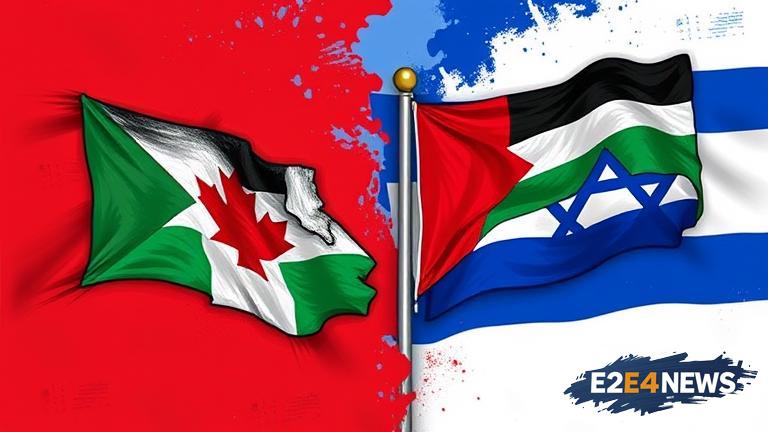In a historic move, the Canadian government has announced its intention to recognize Palestine as a sovereign state in September. This decision is expected to have far-reaching implications for the Middle East peace process and Canada’s relationships with key players in the region. The recognition of Palestine as a state is a long-standing demand of the Palestinian people and has been a major point of contention in Israeli-Palestinian negotiations. Canada’s decision is seen as a significant shift in its foreign policy, which has traditionally been aligned with that of the United States. The move is likely to be welcomed by the Palestinian Authority and other Arab states, but may be met with opposition from Israel and its allies. The Canadian government has stated that its decision is motivated by a desire to promote peace and stability in the region, and to support the rights of the Palestinian people to self-determination. The recognition of Palestine as a state is also seen as a key step towards a two-state solution, which has long been the goal of international efforts to resolve the Israeli-Palestinian conflict. However, the decision is not without controversy, and some critics have argued that it may undermine Israel’s security and compromise its ability to negotiate a peace agreement with the Palestinians. Despite these concerns, the Canadian government remains committed to its decision, and has stated that it will continue to work towards a peaceful resolution of the conflict. The recognition of Palestine as a state is also expected to have significant implications for Canada’s relationships with other countries in the region, including Israel, Jordan, and Egypt. Canada has long been a key player in international efforts to promote peace and stability in the Middle East, and its decision to recognize Palestine as a state is seen as a major contribution to these efforts. The move is also likely to be welcomed by the international community, which has long recognized the need for a two-state solution to the Israeli-Palestinian conflict. In recent years, there has been a growing trend towards recognition of Palestine as a state, with many countries around the world having already taken this step. Canada’s decision is seen as a significant addition to this trend, and is likely to increase pressure on other countries to follow suit. The recognition of Palestine as a state is also expected to have significant implications for the Palestinian people, who have long been denied the right to self-determination and statehood. The move is seen as a major step towards the realization of their rights, and is likely to be welcomed by Palestinians around the world. However, the decision is not without challenges, and the Canadian government will need to navigate complex diplomatic relationships in order to implement its decision. The recognition of Palestine as a state is also likely to have significant implications for the Israeli-Palestinian peace process, which has been stalled for many years. The move is seen as a potential breakthrough in negotiations, and may help to create a new momentum towards a peaceful resolution of the conflict. Despite the challenges ahead, the Canadian government remains committed to its decision, and is working towards a peaceful and stable resolution of the conflict. The recognition of Palestine as a state is a significant development in the Middle East peace process, and is likely to have far-reaching implications for the region and the world. Canada’s decision is seen as a major contribution to international efforts to promote peace and stability, and is likely to be welcomed by the international community. The move is also expected to have significant implications for Canada’s relationships with other countries in the region, and is likely to increase pressure on other countries to recognize Palestine as a state. In conclusion, Canada’s decision to recognize Palestine as a state in September is a significant development in the Middle East peace process, and is likely to have far-reaching implications for the region and the world.
